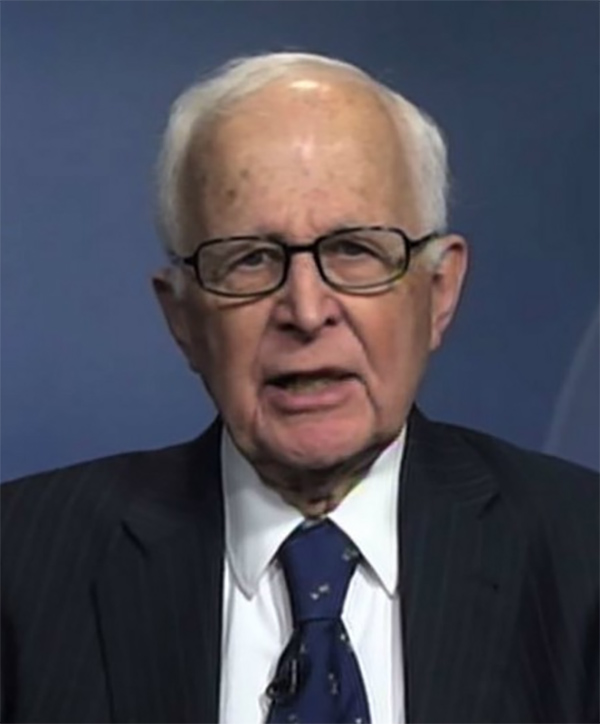At 86, Paul R. McHugh could have opted for a quiet retirement. Instead, the Johns Hopkins psychiatrist has stepped further into the culture wars, arguing that common narratives about gender and sexual orientation may be wrong, that people aren’t “born this way,” and that medical interventions for transgender people are experimental, misleading, and even dangerous.
McHugh has received substantial opposition from researchers and clinicians who argue that at best, he engages in a selective reading of the scientific literature, which has continued to uncover compelling evidence that both gender dysphoria and sexual orientation have biological origins. Advocates for LGBTQ rights, meanwhile, suspect McHugh’s claims are driven less by science than by pure bias. The Human Rights Campaign, a major LGBTQ organization, launched a campaign targeting him earlier this year.
For all of his critics, however, McHugh’s status as a Johns Hopkins professor and a former chief psychiatrist at one of the country’s most prestigious teaching hospitals has made him difficult to ignore. And his influence is all the more noteworthy given the current — and often heated — debates over LGBTQ rights, from efforts in many states to enact so-called “bathroom bills” that many people regard as discriminatory, to the frontiers of science itself, which is still sorting out the precise mix of nature and nurture that produces our gendered and sexualized selves.
As much as anything, McHugh’s work may also be a triumph for a particular kind of scientific dissent — one that can blur the lines between politics and scientific inquiry, and turn genuine nuance into a partisan fog.
McHugh has made public statements on LGBTQ topics, usually contrarian, since at least the 1970s, but he escalated his campaign last August when he and a colleague, the biostatistician Lawrence Mayer, published a 143-page review of the scientific literature on gender and sexuality in The New Atlantis, a small journal published under the auspices of the Ethics and Public Policy Center, a conservative advocacy group. Their message to the public, McHugh told me in an interview, is that “the science does not say what you’re being told often it does say.”
It should be noted at the outset that neither McHugh nor Mayer specializes in sexuality or LGBTQ health. Their report also was not peer reviewed, and it contains no original research. Still, it quickly gained traction in conservative media, and large chunks of it appeared, verbatim, as expert testimony during hearings on North Carolina’s controversial bathroom bill. Adam Keiper, the editor of The New Atlantis, estimated that at least half a million people have accessed the report so far. As of this month, the document has been translated into French, German, Arabic, Spanish, and Russian.
A follow-up report, published in June in The New Atlantis and focusing on a specific hormone treatment used for adolescents with gender dysphoria who want to delay puberty, was covered in The New York Post under the headline “Hormone therapy is a horrible risk for kids.”
In one sense, what McHugh and Mayer do in their report is simply assemble a lot of claims that challenge the simplistic notion that sexual orientation and gender are entirely hard-wired, wholly unchanging, thoroughly understood, and absolute byproducts of a person’s biology. Indeed, they summarize evidence that few researchers into human sexuality would disagree with: that identities can sometimes be fluid, and that there’s still a lot that researchers don’t understand about these topics.
The more charged parts of the report come largely through implication and interpretation. McHugh and Mayer suggest, for example, that social stigma alone cannot account for higher rates of mental illness within the LGBTQ community compared to the population at large — an invitation, it would seem, to conclude that homosexual and transgender identities are themselves linked to mental illness. They also argue that there’s insufficient evidence that medical options available for people with gender dysphoria — including surgeries for adults and puberty blockers for adolescents — are safe and effective.
“He’s right in the sense that there’s not as much data as, sure, probably everyone would wish that we had,” says Kristina Olson, an associate professor of psychology at the University of Washington who researches care for gender-nonconforming kids. She hesitates, though, to say that this means clinicians should simply back off on offering treatments like puberty blockers. “I think that’s true probably of nearly everything that involves the medical industry, right? We don’t have all the slam dunk studies done.”
Jack Drescher, a psychiatrist and psychoanalyst who helped write the section on gender for the most recent edition of the American Psychiatric Association’s Diagnostic and Statistical Manual of Mental Disorders, made a similarly pragmatic point. “Does his report actually offer alternatives?” he asked. “Because I don’t know of anybody who’s discovered a way to actually talk a transgender person out of their gender dysphoria.”
Critics of McHugh and his collaborators have focused on his claim to be doing rigorous scientific work — and on the social and political implications of making these kinds of claims about LGBTQ people. A letter signed by nearly 600 researchers and clinicians in March took issue with how some conservative activists and media figures were citing the New Atlantis report as hard science, even though it was never peer reviewed. “We, as scientists, thought that it was important that the article would be portrayed in its proper context,” said Lauren Beach, an organizer of the letter and the director of research at the LGBTI (lesbian, gay, bisexual, trans, intersex) program at Vanderbilt University Medical Center, “of really being an opinion piece written by Drs. Mayer and McHugh.”
Chris Beyrer, an epidemiologist who specializes in LGBTQ health issues at Johns Hopkins and a vocal critic of McHugh, was more blunt: “It’s sort of the usual junk science, cherry-picking data, outdated theories,” he said. “It got picked up, and it is basically being used to say, ‘Johns Hopkins agrees that sexual orientation is a choice that can be cured, that transgenderism is an illness.’
“If somebody were putting forward the intellectual inferiority of women compared to men, or blacks are inferior to whites, it would be hard to argue that they had the academic freedom to do that,” Beyrer told me. “That’s junk science. And that’s how it feels from an LGBT perspective.”
In April, the Human Rights Campaign launched a website, McHugh Exposed, that accuses McHugh of peddling “alternative facts.” The organization also asked Johns Hopkins to distance itself from McHugh’s reports. Unsatisfied with the medical school’s response, the group deducted points from the Johns Hopkins Hospital in its annual Healthcare Equality Index, which scores hospitals based on treatment standards for LGBTQ patients.
“McHugh’s writings are having tangible, harmful impacts on LGBTQ people,” said Sarah McBride, the national press secretary for the Human Rights Campaign, “particularly transgender youth across the country.”
In interviews, McHugh and his collaborators insist that they’re simply filling their duty as scientists — and at what they characterize as genuine professional risk. Mayer told Undark that he had strong reason to believe that his contract as an adjunct instructor at Johns Hopkins’ Bloomberg School of Public Health was terminated last summer over his work on the report. (A spokesperson said the school “does not comment on personnel matters”). Paul Hruz, who collaborated with Mayer and McHugh on their more recent New Atlantis report, was recently removed as head of pediatric endocrinology at Washington University in St. Louis. “I believe that [my] concern about current gender dysphoria treatments was a significant contributing factor,” he wrote in an email.
“We’ve all suffered,” Mayer told me.
For his part, McHugh described the Human Rights Campaign as a “thought control organization” and said the group “wants to silence me” — a charge that McBride squarely disputed. “They are certainly free to express the opinions that they wish to express,” she said.
Beneath the professional sniping, though, there’s a classic narrative at work here — particularly in McHugh’s story. It’s one of the brave scientific dissenter who sticks to his intellectual principles, despite hostility from established powers and close-mindedness from intellectual peers. It’s a trope that has gained political currency in our polarized political era, and its particulars will be familiar to any close observer of debates over climate change, vaccination, and other contentious issues.
There is little question, after all, that McHugh and his co-authors are engaging with some genuine points of nuance, scientific uncertainty, and ongoing exploration in a particular field. But by carrying high-profile credentials into the publication of meta-analyses that bypass peer review, this form of scientific dissent can be hard to distinguish from simple partisan advocacy.

“The science does not say what you’re being told often it does say,” McHugh told me.
Visual: YouTube Screenshot/EWTN News
In conversations with Undark, McHugh was quick to push points that were either deeply subjective — for example, that women can never really become men — or that simply didn’t have any empirical support — at one point, the psychiatrist insisted that as many as 30 percent of people who transition come to regret their decision. (When pressed, he mentioned Walt Heyer, an activist who runs the website SexChangeRegret.com and a Christian ministry that addresses gender nonconformity.)
According to public court filings, Mayer was presented as an expert witness last August in the North Carolina bathroom bill hearings, receiving $400 per hour for a testimony in which he used large blocks of text that would be published, verbatim, a few days later in the now widely circulating The New Atlantis report. Keiper, The New Atlantis editor, insisted that the report was “really not a political document,” but when asked why his publication did not acknowledge that portions of the report had appeared verbatim in a federal court hearing, Keiper said “I can’t reconstruct the timeline for you” and described the use of material from the report as “really out of my control.”
(Keiper did acknowledge that his publication holds the copyright to the report.)
No one can know for certain what truly motivates McHugh and his colleagues, all of whom have done sound scientific work and published the sort of peer-reviewed research that has earned them their lofty academic positions. But there’s real danger in the sort of political and ideological entanglements that seem to have attended the New Atlantis report, not least because they ultimately make it harder for people to distinguish between rigorous scientific dissent and one-dimensional advocacy.
Instead of generating a more nuanced conversation — which, in theory, productive dissent should do — such endeavors tend to polarize the conversation further, and they run the risk of leaving us in a world where there’s less space for healthy scientific debate, and instead just two different sides, each listening to its own set of experts.
With LGBTQ issues, there’s an added danger, which is that the chorus of scientific voices can drown out the experiences of the very real people whose lives are most affected by these debates. I recently read through a section of Mayer and McHugh’s original report with Susan Stryker, a professor of gender and women’s studies at the University of Arizona and a pioneer in the field of transgender studies. As we discussed claims that gender wasn’t fixed or biologically hardwired, Stryker pointed out that she agreed with some of McHugh’s points — but not with his premises. For Stryker, the key question is why people are willing to listen to McHugh, as a scientist, more than they are to the reported experiences of transgender people.
“Trans people are basically put in a position of saying things like, ‘You know, I’m not crazy’ or ‘You know, surgery really helped me,’ or ‘I feel right in my body now that I’ve taken hormones.’ Those kinds of self-reports are not deemed as being as authoritative as scientists making this pronouncement,” Stryker said. “So what counts more?”
Michael Schulson is an American freelance writer covering science, religion, technology, and ethics. His work has been published by Pacific Standard magazine, Aeon, New York magazine, and The Washington Post, among other outlets, and he writes the Matters of Fact and Tracker columns for Undark.












Comments are automatically closed one year after article publication. Archived comments are below.
There are a number of fully referenced articles, pdf’s on our website regards childhood gender dysphoria (transgenderism) that back up what Dr. McHugh found in his report. Also videos and transcripts.
https://www.stopsafeschools.com/
First of all, Hugh being treated in this article like esteemed author is a load. Look at the publications they actually link as proof of his ‘esteemed’ career. Most of them involve papers trying to posit that PTSD is a non-existent illness as defined by the DSM. Guess how well all that research has held up with time?
Additionally worth mentioning is the fact that he is on the pay roll of far-right advocacy and catholic groups, and was once quoted as saying that the catholic church abusing and molesting little boys was not paedophilia. I’m sure that statement is completely unconnected to the fat sum of cash he received from the Catholic church though.
This man is a shill desperately trying to cash in on his failed career to make a few quick bucks by doing untold damage to at-risk minorities. His studies are the most prominently quoted in most alt-right transphobic content which has led to many thinking their is a scientific basis for the idea of trans as a mental illness which is simply not true.
I new when I was 3 I wanted to be a girl, I tried to commit suicide at 8, and I spent my whole life dreaming and day dreaming about the need and the desire to become a woman. I am not going to let negative people try and make me change my mind.
When I was 16 and very interested in animal husbandry which I passed at Ag School came out and said I have a mutation in one of my genes the other students laughed but I never told them why. But to me it is more than just a mental illness because why would a person destroy their life with alcohol and drugs and didn’t care if he woke up or not and then potentially destroy their life again by coming out and telling the truth that they always wanted to be a woman.
This piece ends with an appeal to listen to people’s experiences. But Walt Heyer is more than simply an “activist”, as the article dismissively says. He himself actually underwent trans surgery and came to regret it, as did hundreds of people who have contacted him. Why aren’t his and their experiences valid?
Because Mr. Heyer did not and does not have gender dysphoria. Mr. Heyer has dissociative identity disorder, colloquially known as multiple personality disorder, with I believe 7 personalities. One of those personalities is a woman that while Heyer was disassociated into convinced a surgeon to perform a sc reassignment surgery without the standard psychological treatment prior to surgery, or a history of gender dysphoria. Essentially, Mr. Heyer poisons the well with his disingenuine presentation of his story.
The comment at the end of this article makes it seem that trans people all feel helped by surgery and hormones and that the report being discussed conflicts with this… when there are several video testimonies of trans people themselves and persons who worked with them that say otherwise – that they regret having journeyed on the venture of sex change and that they still kept feeling the same or worse. Some prefer if they were counselled out of such a decision to alter their bodies. So better not misinform people and giving false hopes. There are many unknowns and many taboos on this topic and various professionals, especially those without an admirable career behind them that gives them authority, are intimidated and stick to the the politically correct in order not to be attacked like McHugh was and others like him.
Thank you for a very informative article.
“Stigma” is the victimizers’ term. Never ought it be adopted by those victimized by it!
Prejudice and discrimination are the visceral, experienced realities.
Those are the words to employ.